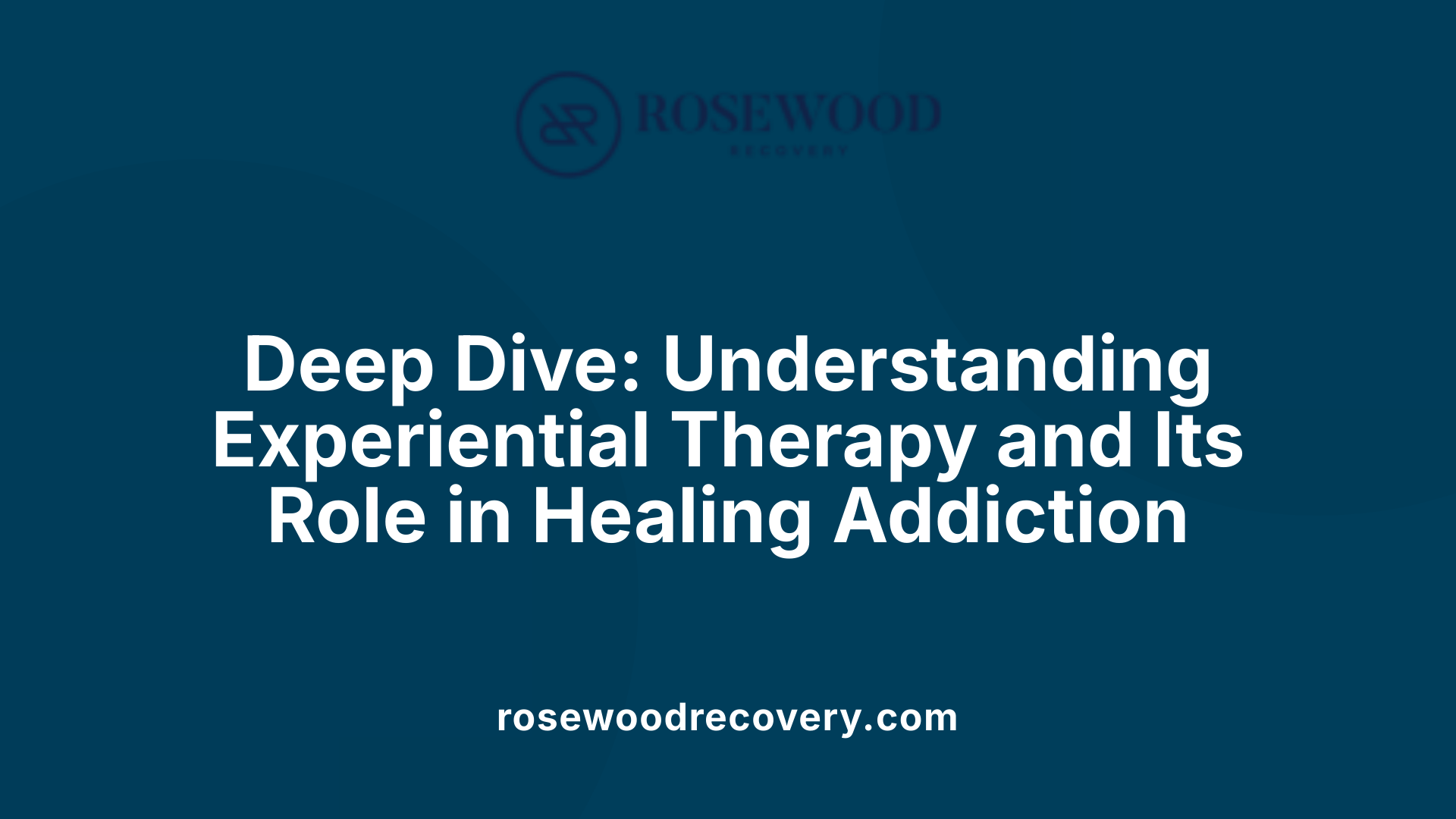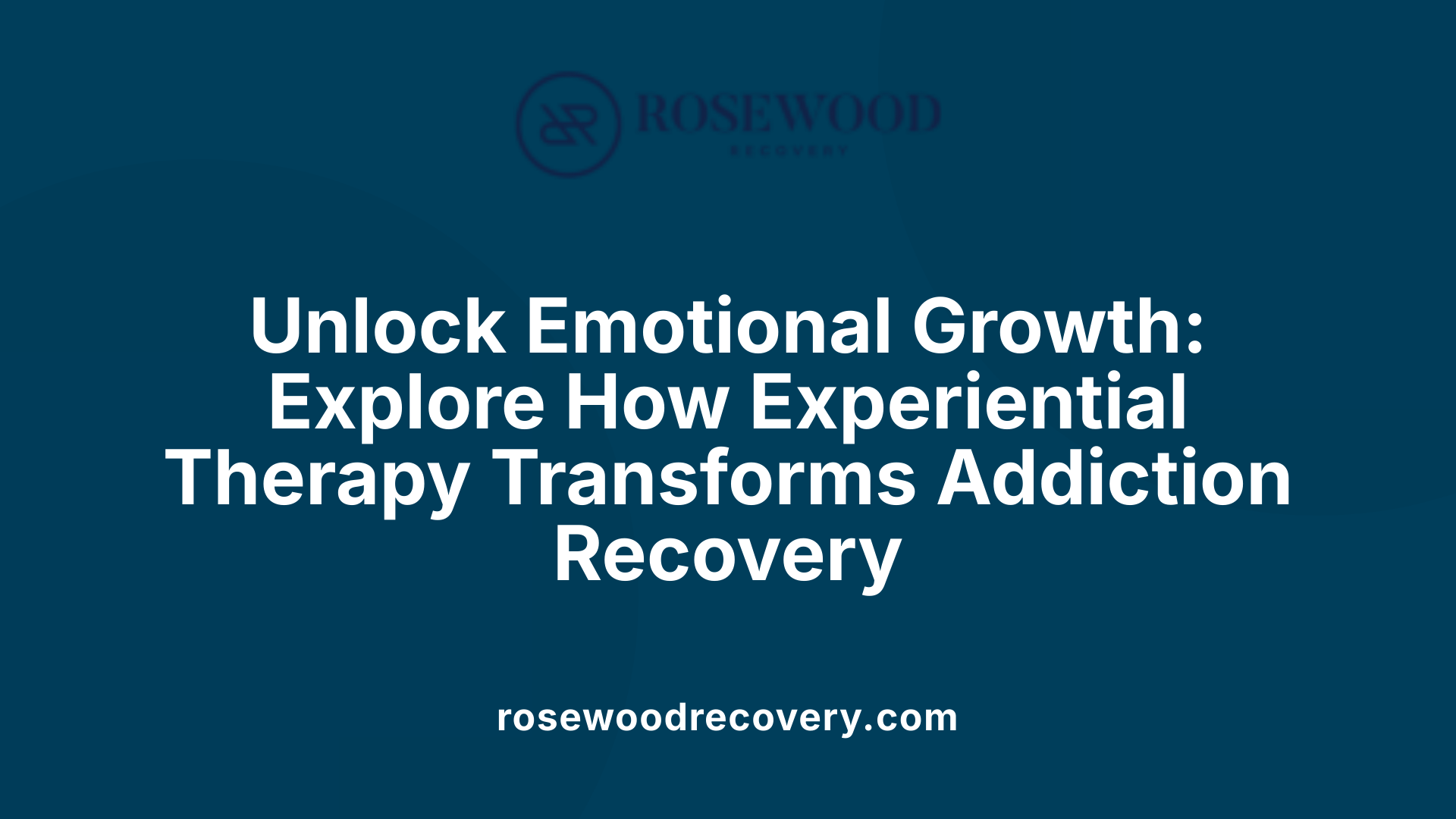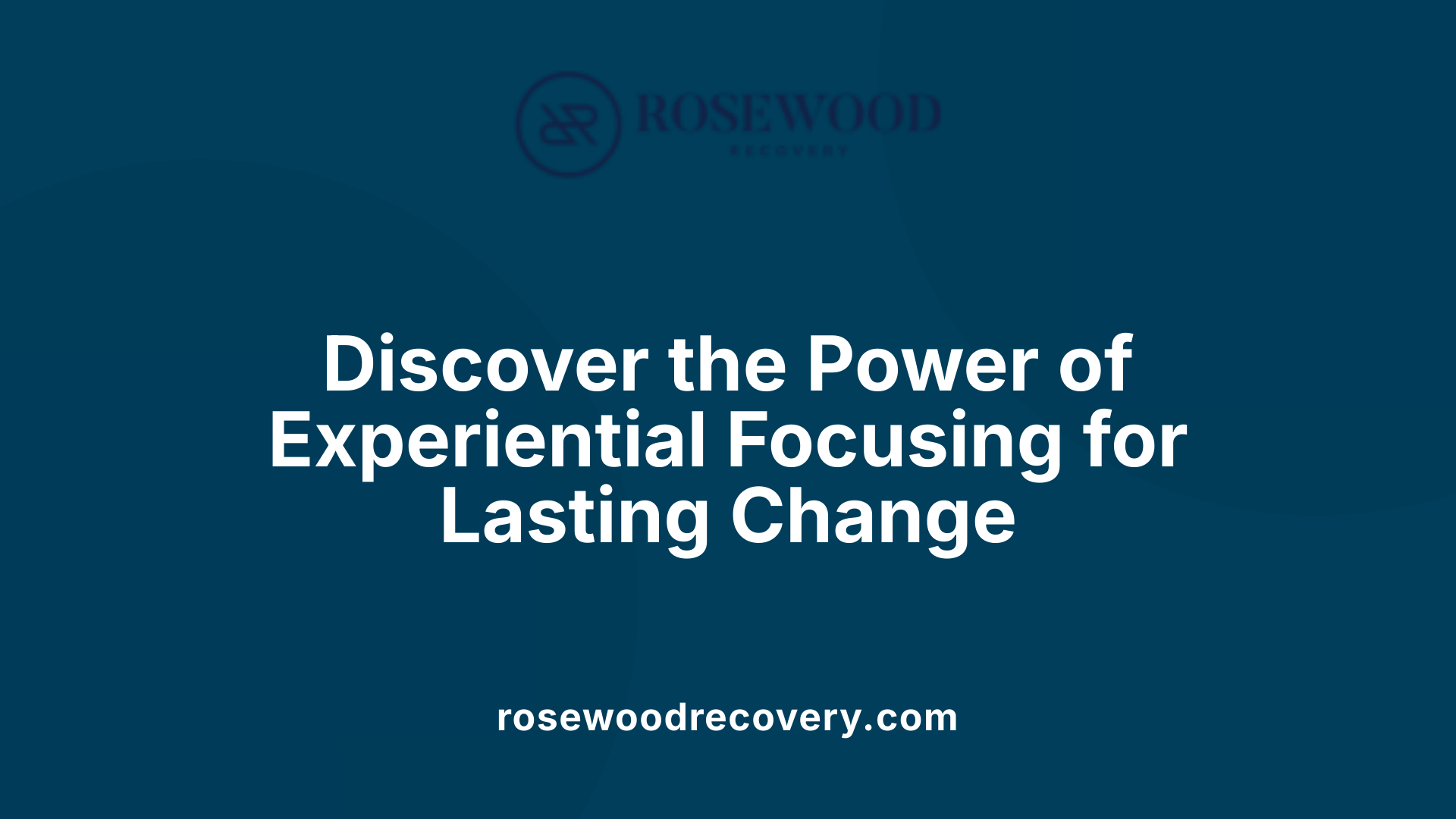Understanding the Power of Experiential Therapy in Addiction Treatment
Experiential therapy is an innovative, hands-on approach increasingly recognized as a vital component in comprehensive addiction recovery programs. It involves engaging clients through physical activities, creative expression, and real-world experiences that facilitate emotional processing, insight, and personal growth. By moving beyond traditional talk therapy, experiential methods help individuals access deep-seated emotions, explore unresolved trauma, and develop healthier coping strategies, ultimately supporting sustained sobriety and well-being.
Defining Experiential Therapy and Its Application in Addiction Treatment

What is experiential therapy?
Experiential therapy is a dynamic form of treatment that involves engaging individuals through physical, creative, and sensory activities. Unlike traditional talk therapy, it emphasizes active participation in exercises like art, music, role-playing, outdoor adventures, and animal-assisted interventions. These activities help clients explore deep emotions, process past traumas, and gain insights into their behaviors.
Through these hands-on experiences, individuals can bypass verbal limitations and access subconscious feelings that often drive destructive patterns. Experiential therapy promotes self-awareness, emotional release, and personal growth by encouraging reflection on the experience itself.
How is it used in addiction treatment?
In addiction recovery, experiential therapy serves as a powerful complement to conventional treatments such as cognitive-behavioral therapy (CBT) and medication-assisted approaches. It creates a safe environment for clients to confront triggers, express suppressed emotions, and develop healthier coping strategies.
Practices like equine therapy, art and music therapy, adventure activities, and psychodrama allow individuals to simulate real-life challenges, practice new skills, and rebuild self-confidence. Engaging in these activities helps break emotional numbness often associated with substance use and enhances resilience against relapse.
Group or partner-based experiential therapies further foster trust, improve social skills, and support emotional connection—elements vital to sustained sobriety. Incorporating experiential methods can lead to deeper emotional processing, aid in trauma resolution, and foster a sense of empowerment. When integrated into a comprehensive treatment plan alongside traditional therapies, experiential therapy significantly supports holistic healing and long-term recovery.
Core Techniques of Experiential Therapy
Experiential therapy encompasses a diverse set of active and creative techniques designed to facilitate emotional healing and personal development through direct experience. Central methods include role-playing and psychodrama, which allow individuals to reenact and process past conflicts or new scenarios in a safe environment.
Art therapy and music therapy provide avenues for self-expression beyond words, helping clients tap into subconscious feelings and release pent-up emotions. Animal-assisted therapies, such as equine or therapy dog interactions, foster connection, trust, and emotional reflection.
Outdoor adventure activities, including hiking, ropes courses, and wilderness expeditions, challenge participants physically and mentally, building resilience and problem-solving skills. Guided imagery and expressive arts facilitate sensory awareness and symbolic understanding of emotional states.
Physical activities like dance or yoga help clients reconnect with their bodies, promoting mindfulness and stress reduction.
These techniques focus on engaging the body and senses, often helping people who find verbal communication difficult, or who have experienced trauma. By re-experiencing and acting out feelings, clients achieve deeper insights, emotional release, and behavioral change.
Overall, experiential therapy employs a variety of hands-on interventions that promote self-awareness, emotional processing, and growth through direct, embodied experiences.
Goals and Outcomes of Experiential Therapy in Addiction Recovery

What is the goal?
The main aim of experiential therapy in addiction recovery is to deepen self-awareness and emotional expression through active participation. This approach uses creative, physical, or interactive activities—such as art, music, or equine therapy—to help individuals access difficult feelings and memories safely. These activities allow clients to uncover subconscious thoughts, biases, and emotional patterns that often drive addiction.
By engaging in these hands-on experiences, individuals can better understand their behaviors and develop healthier ways to manage emotions. The process supports emotional regulation, personal growth, and insight into underlying issues, all of which are crucial for lasting change. Ultimately, the goal is to address the emotional and psychological roots of addiction, making healing more sustainable.
What are the benefits?
Experiential therapy offers several benefits, especially for those struggling with addiction. It provides a safe space for expressing complex emotions like shame, anger, and sorrow. This emotional release is vital for healing trauma and breaking down denial.
Additionally, engaging in creative and physical activities enhances self-esteem and fosters a sense of accomplishment. Participants often develop better coping skills, resilience, and a more positive outlook on recovery.
Collaborative activities also promote trust and social connection, which are critical in addiction treatment. The approach’s immersive nature makes it more engaging than traditional talk therapy, encouraging clients to be active participants in their healing journey.
Adding experiential methods to a comprehensive treatment plan can improve emotional regulation, reduce relapse risk, and support long-term sobriety, helping individuals rebuild their lives with healthier habits and outlooks.
Evidence Supporting Experiential Therapy in Addiction Treatment

Is experiential therapy an evidence-based approach?
Experiential therapy includes various techniques that involve active, physical activities like art, music, role-playing, animal-assisted therapy, and outdoor adventures. These methods focus on engaging the senses and emotions to promote insight and emotional release. Research shows that certain experiential therapies, such as art therapy and animal-assisted therapy, can improve mental health outcomes. They have been linked to reduced denial, better social skills, and symptom alleviation in conditions like trauma, mood disorders, and addiction.
While some components, especially equine therapy, have mixed or inconclusive research results, the overall body of evidence indicates that experiential therapy can serve as a valuable complementary treatment. It is frequently combined with evidence-based practices like cognitive-behavioral therapy (CBT) to enhance emotional processing and personal growth.
Studies support that experiential therapy can lead to positive short-term and long-term benefits, including increased self-awareness, emotional regulation, and resilience. Despite some variability across modalities, many experts recognize its role in fostering meaningful change, particularly when tailored to individual needs and used within a comprehensive treatment plan.
In summary, elements of experiential therapy are supported by research as effective adjuncts for treating addiction and related mental health issues, especially when integrated with traditional approaches. Continuous studies are further clarifying its specific applications and benefits.
Common Activities for Adults in Experiential Therapy
What activities are used?
Experiential therapy employs a diverse array of hands-on activities that aim to foster emotional expression, self-awareness, and growth. For adults, common activities include art therapy, music therapy, and expressive writing. These creative approaches enable individuals to explore their feelings and process complex emotions in a safe environment.
Outdoor activities are also central, especially adventure therapy, hiking, kayaking, and wilderness expeditions. Such activities promote resilience, teamwork, and personal development by challenging participants physically and mentally. Animal-assisted therapy, with horses or dogs, helps build trust, empathy, and emotional regulation—crucial components in recovery and trauma processing.
Role-playing techniques like psychodrama allow individuals to reenact conflicts, gain new perspectives, and confront unresolved issues. Complementary practices such as mindfulness, yoga, and body-centered activities support stress reduction and emotional regulation. These varied experiential activities work holistically, addressing trauma, promoting mental health, and fostering trust and insight. They create an engaging environment that encourages healing and resilience, making therapy more dynamic and effective for adult clients.
Why Experiential Focusing Is a Transformative Intervention

Why is experiential focusing considered a powerful intervention?
Experiential focusing holds a reputation as a transformative approach within therapy because it actively immerses clients in expressive and interactive activities. Unlike traditional talk therapy, which primarily relies on verbal communication, experiential focusing employs methods such as art, music, role-playing, equine therapy, and outdoor activities to deepen emotional exploration.
By engaging the senses and body in the therapeutic process, clients can access emotions and thoughts that are often buried beneath conscious awareness. This embodied approach allows individuals to embody their feelings, gain clarity, and release stored emotional tension.
For example, through art or music therapy, clients can express complex emotions like shame, anger, or grief that may be difficult to articulate with words. This creative exploration fosters self-awareness, helping clients understand the root causes of their struggles and develop healthier coping mechanisms.
Moreover, experiential focusing can spark creativity, increasing self-esteem and a sense of achievement as clients complete projects or conquer fears. The active participation in these activities often leads to breakthroughs in processing trauma or addiction and promotes a sense of empowerment.
The immersive nature also enhances emotional engagement, making healing more accessible and meaningful. As clients experience their inner worlds physically and imaginatively, they often find new perspectives and insights that drive long-lasting change.
Studies and clinical observations suggest that this participatory approach can reduce anxiety, improve mood, and support emotional regulation, vital for recovery from various mental health issues. Overall, its significance lies in transforming passive introspection into active, embodied healing, making experiential focusing a crucial and impactful tool in modern therapy.
Integrating Experiential Therapy for Sustainable Recovery
Experiential therapy's active, immersive nature makes it an invaluable tool in addiction recovery. By fostering self-awareness, emotional expression, and resilience, these approaches complement traditional methodologies to address the complex facets of addiction. When integrated into comprehensive treatment plans, experiential therapies can lead to deeper insights, stronger emotional regulation, and lasting behavioral change, ultimately enhancing long-term recovery outcomes. As research continues to support its efficacy, experiential therapy stands out as a catalyst for genuine transformation and empowered living.
References
- Experiential Therapy | Hazelden Betty Ford
- The Benefits of Experiential Therapy in Addiction and Mental Health ...
- 5 Benefits of Experiential Therapy - Promises Behavioral Health
- The Positive Impact of Experiential Therapy on Addiction Treatment
- Experiential Therapy: Nontraditional Addiction Treatment
- What Is Experiential Therapy? (Activities and Examples)
- Experiential Therapy For Addiction Treatment in Texas
- What is Experiential Therapy & How It's Used in Rehab
- Experiential Therapy for Addiction Recovery

.jpeg)


